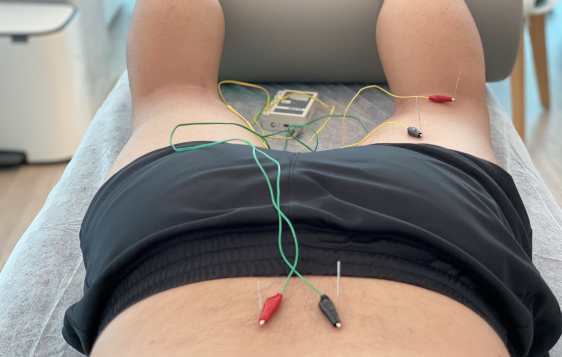Percutaneous neuromodulation
Ultrasound-guided percutaneous neuromodulation technique is defined as the use of an ultrasound-guided needle to produce electrical stimulation of a peripheral nerve at a point along its path or of a muscle at a motor point, with a therapeutic objective.
That is, we use a puncture needle associated with a low or medium frequency electrical current to induce a sensory and/or motor response by stimulating the peripheral nerve.
A technique which, in short, allows us to stimulate the peripheral nerve very precisely at the root level and along its path.
In the interest of safety and effectiveness, this technique must be applied while using ultrasound. The professional performing ultrasound-guided physiotherapy must be highly-knowledgeable of human anatomy.
The application is based on stimulation using a puncture needle associated with a low or medium frequency electrical current, in order to induce a sensory and/or motor response by stimulating the peripheral nerve, or to achieve a motor response by stimulating the motor point.
We should remind you that neuromodulation is a safe, effective technique that is practically painless. Percutaneous neuromodulation is one of the most requested techniques among our patients.
Because this therapy offers a shorter recovery time and better prognosis, it has earned a place for itself among workers and athletes who practice diverse sports, for whom this type of therapy can positively impact the treatment of their injuries and even improve their athletic performance. Next, we present a series of indications and contraindications associated with the application of this technique. The contraindications, as you can see, are based exclusively…

INDICATIONS
• Herniated disc, cervicobrachialgia, sciatica
• Headaches, cranial neuralgia
• Neuropathic pain (pain generated by the nerve)
• Musculoskeletal pain
• Improved activation/ neuromuscular control
• Loss of sensation
• Joint instability
• Muscle tears
Contraindications:
• Fear of needles
• Clotting problems
• Allergies to metals (such as nickel; although there are needles made of a number of different materials, an evaluation must be made and taken into account)
• In pregnant women (in areas close to the pelvic and abdominal regions)
In our Clinic we will make you a detailed study: we will see if it is the most suitable for your case, we will explain the process and we will give you all the necessary information to deal with this type of technique with guarantees.


